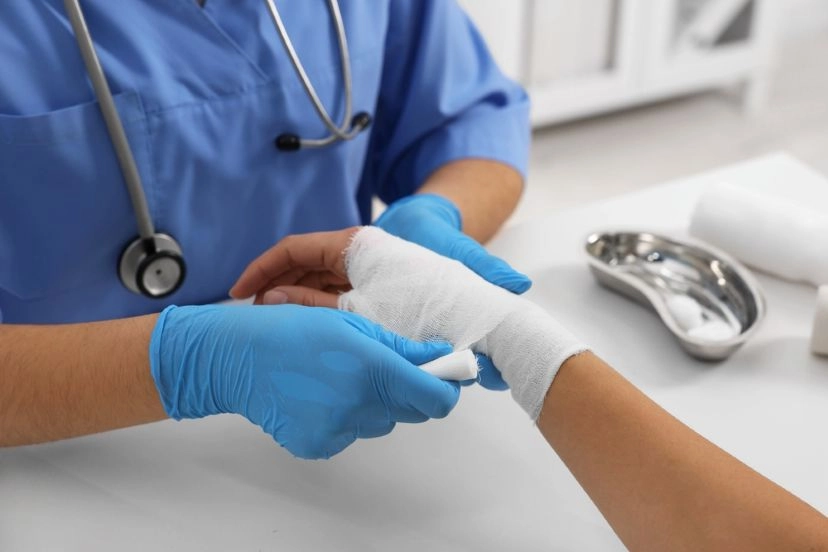Hemorrhoid Surgery with Minimal Pain Using RFA (Radiofrequency Ablation)

Hemorrhoids are a common condition in adults, primarily caused by increased pressure in the veins around the anus. This can result from constipation, frequent straining during bowel movements, sitting for long periods of time, or even genetics that predispose someone to the condition. The severity of hemorrhoid symptoms varies, ranging from early-stage symptoms like itching, mild pain, or slight bleeding, to more severe cases where the hemorrhoids protrude outside the anus and cannot be pushed back in.
Currently, there are various methods for treating hemorrhoids, ranging from lifestyle changes such as consuming a high-fiber diet, drinking plenty of water, and taking medication, to procedures like injection therapy, rubber band ligation, laser treatment, and radiofrequency ablation (RFA). RFA has become increasingly popular as an effective alternative due to its minimal pain and quick recovery time.
Radiofrequency Ablation (RFA) treatment uses high-frequency radio waves directed at the hemorrhoid area to create localized heat at the tissue level. This heat causes the blood vessels responsible for the hemorrhoids to shrink and collapse. This process cuts off the blood flow within the hemorrhoid, helping it to shrink and reducing the likelihood of recurrence.
Advantages of RFA (Radiofrequency Ablation) Principle:
• Localized Heat It targets specific areas without damaging surrounding tissue unnecessarily.
• Small Wounds and Quick Recovery No need for wide incisions, leading to faster healing.
• Minimal Pain Directly destroying the blood vessels reduces post-procedure pain.
• High Precision Doctors can control the size and depth of the heat application for accurate treatment.
Steps for Hemorrhoid Treatment with RFA (Radiofrequency Ablation)
1. Preparation Before the Procedure
• The patient should consult a doctor for an assessment of symptoms and the severity of the hemorrhoids.
• Fasting (food and water) should be followed as per the doctor’s instructions, depending on whether local anesthesia or general anesthesia will be used.
• In some cases, an enema may be performed before the procedure to clean the rectal area, ensuring a clearer and more convenient working environment.
2. Anesthesia/Anesthesia Administration
• Depending on the patient's condition and cooperation, the doctor may administer local anesthesia or use injectable/inhaled general anesthesia.
3. Radiofrequency Procedure
• The doctor will use a special device that emits high-frequency radio waves to the hemorrhoid tissue.
• The heat generated by the radio waves causes the blood vessels in the hemorrhoids to shrink and collapse.
• In some cases, suturing may be done to reduce the risk of post-procedure bleeding.
4. Post-Procedure Care
• After the procedure, most patients are monitored briefly in the recovery room.
• The doctor will provide instructions on wound care and medications to relieve pain or reduce inflammation.
• The patient can return home and resume normal daily activities fairly quickly, as long as there are no complications.
Advantages of RFA Treatment
• No Wide Incision Needed The wounds are small, and post-procedure pain is less compared to traditional surgery.
• Quick Recovery Patients typically return to their daily activities in a short amount of time without needing extended rest.
• Reduced Risk of Infection There are no large open wounds, minimizing the risk of infection.
• Repeatable Treatment If symptoms recur, the doctor can perform RFA again without creating large scars from previous procedures.
Post-RFA Surgery Self-Care
1. Eat a High-Fiber Diet Include food like vegetables, fruits, and whole grains to prevent constipation and straining during bowel movements.
2. Drink Plenty of Water Aim for 6-8 glasses (about 1.5-2 liters) of water per day, or more depending on your activity level, to keep stools soft.
3. Avoid Prolonged Sitting or Standing Stand up and change positions every 1-2 hours to reduce pressure on the veins around the anus.
4. Maintain Cleanliness Around the Anus After bowel movements, clean the area with clean water or gently rinse with warm water to prevent inflammation or infection.
5. Avoid Heavy Lifting Reduce strain during the recovery period and follow the doctor’s advice regarding lifting heavy objects or exercise activities.
6. Monitor Symptoms Regularly If there is increased pain, unusual bleeding, or any other concerning symptoms, contact your doctor promptly.
RFA (Radiofrequency Ablation) surgery for hemorrhoids is a new, highly effective option that reduces pain and offers a faster recovery compared to traditional surgery. It is suitable for patients with moderate to severe hemorrhoids, as well as those who seek a safe procedure with small incisions and a lower risk of recurrence. The treatment should be performed by a skilled doctor. However, lifestyle changes, including eating a high-fiber diet, drinking enough water, and maintaining general health, remain essential in preventing hemorrhoids from recurring in the long term.
If you suspect or are concerned that you might have symptoms of hemorrhoids, it is important to consult a doctor for advice on the appropriate treatment options. This includes evaluating whether RFA (Radiofrequency Ablation) is a suitable choice for you. After receiving treatment, following the doctor’s instructions for proper self-care will help promote faster healing, reduce the risk of recurrence, and improve your long-term quality of life.


